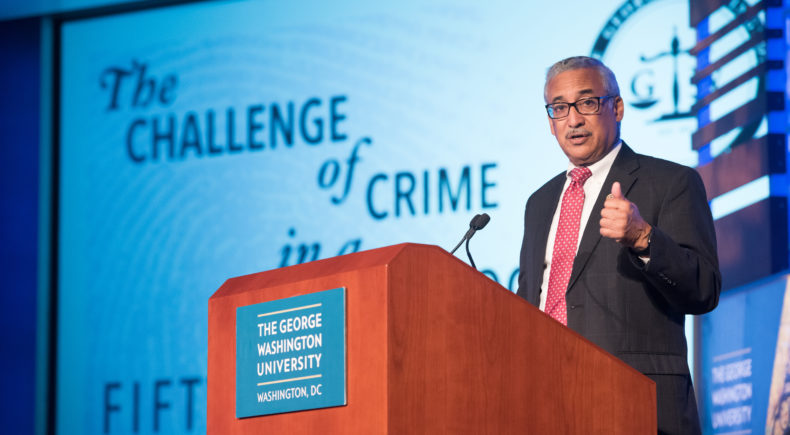Symposium 2017 | Keynote Address by Congressman Bobby Scott
Congressman Bobby Scott, Representative of the 3rd District of Virginia, is the Ranking Member of the Committee on Education and the Workforce of the 114th–115th Congress. He previously served as a Ranking Member of the Task Force on Over-Criminalization of the 113th Congress. On October 27, 2017, Congressman Scott delivered the morning keynote address at The George Washington Law Review’s Symposium, The Challenge of Crime in a Free Society: Fifty Years Later. The Congressman’s remarks focused on the importance of prevention, early intervention, and rehabilitation.
Much in line with the report by President Lyndon Johnson’s Commission on Law Enforcement and Administration of Justice Johnson Commission Report published in 1967, Congressman Scott stressed the importance of keeping juveniles out of the criminal justice system. Congressman Scott said that while there is little debate on the need for crime policy, there is debate on the purpose of crime policy. According to Congressman Scott, the purpose should be to keep youth out of the cycle of criminal imprisonment and reimprisonment. He explained this purpose to be one driven by data and research, compared to alternatives driven by “soundbites, slogans, and politics.”
At the time, the Johnson Commission Report suggested sweeping changes for police, courts, and corrections, outlining seven objectives and over 200 recommendations. Even 50 years ago, the Report stressed the importance of helping first-time offenders avoid the cycle of imprisonment. The Report also suggested removing overly-lengthy mandatory minimum prison terms. In addition, the Report called for providing treatments and services to drug offenders, a suggestion reflecting the view of drug use as a public health problem rather than a criminal one. This is an important distinction given studies that show that criminal punishment does not impact one’s drug use. As an example, Congressman Scott pointed out that the different punishments for use of crack cocaine (mandatory five-year incarceration) versus for use of powder cocaine (probation) does not result in users switching from one form of the drug to another. Considering these facts, the Congressman questioned the draconian mandatory minimum sentences imposed by the Anti-Drug Abuse Act of 1986, for which President Obama had created a commutation program to allow for the release of low-level, non-violent first offenders who had spent a number of years in jail.
If our legal system had adapted the Johnson Commission Report’s suggestions, the racially disproportionate impact of crime policy on African American communities might have been reduced. Congressman Scott offered the statistic that some states imprison African Americans at a rate of 4,000 out of every 100,000 African American citizens. “That’s use of money in the criminal justice system that could be used elsewhere,” he said. Thirty-two states have already experimented with the process of taking money out of prisons and, instead, putting that funding into prevention, early intervention, and rehabilitation. Congressman Scott mentioned Texas as an illustrative example of successfully closing several prisons due to funding policies, which both reduced crime and saved money.
Congressman Scott supports a bi-partisan approach to legislation to implement such policies, which many conservatives also call “right on crime.” Of course, there are other conservative politicians who do not support strategies to promote prevention, early intervention, and rehabilitation. Instead, they support positions such as zero tolerance, trying juveniles as adults, and convicting youth for status offenses. Congressman Scott argued against such views, which do not fix the root causes of crime.
The Congressman concluded his remarks by saying that “history doesn’t repeat itself, but it does rhyme. We have the research, we know what to do, and the only question is if we have the political will and wisdom to make the right choices.” In order to make the right choices, Congressman Scott plans to re-introduce the SAFE Justice Act, which provides for many of the reforms that the Johnson Commission Report called for 50 years ago. The SAFE Justice Act provides for prevention and early intervention, funds for police training, risk-based bail instead of wealth-based bail, and the elimination of mandatory minimum sentences (especially for drug offenses). Congressman Scott explained that almost all of these proposals could be funded by money saved from eliminating mandatory minimums.
This summary was authored by Law Review member Lisa Bei Li.


